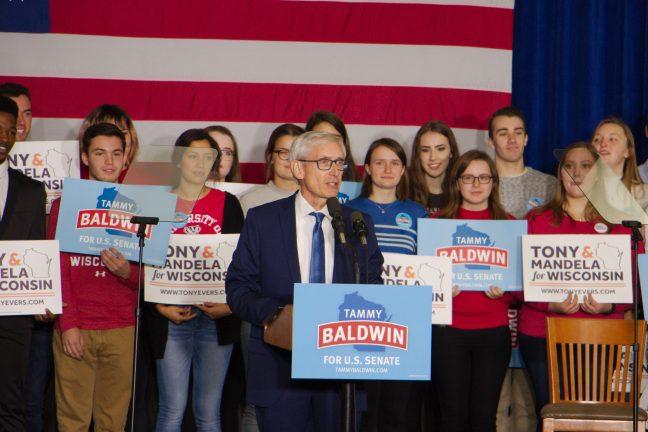While experts and state officials have mostly praised Gov. Tony Evers’ diverse cabinet picks, he has received criticism for its lack of rural representation and its partisanship.
Sworn into office just weeks ago, Evers’ cabinet roster provides insight into how he will lead as governor. So far, Evers has chosen less partisan officials than former Gov. Scott Walker.
Furthermore, six of Evers’ cabinet officials are women and four are people of color — a success for diversity and representation in state government. All four of his top aides are also women.
Rep. David Crowley, D-Milwaukee, said he is happy to hear the governor is moving in the right direction, but hopes he will further commit in improving representation throughout all state departments.
“We have to look at different department positions as well as making sure that African Americans are in certain positions and that we’re really reflective throughout all the state government,” Crowley said.
In a statement to The Badger Herald, Rep. Melissa Sargent, D-Madison, said the cabinet picks are knowledgeable in their respective fields.
She added that the the new members bring diverse perspectives that reflect the needs of Wisconsin’s population.
“Evers’ cabinet is comprised of individuals who are prepared to address issues from a multifaceted scope, and to do so with both pragmatism and compassion,” Sargent said.
As reported by the Wisconsin State Journal, Evers’ cabinet roster features several of his top deputies at the Department of Public Instruction.
University of Wisconsin political science professor John Witte said that while Evers has done well in appointing people who worked with him while he was the state superintendent of public instruction, his challenges in education lie with repairing the relationship with teachers unions.
According to the Milwaukee Journal Sentinel, Evers chose Dawn Crim as secretary of the Dept. of Safety and Professional Services. She currently assists Evers as assistant state superintendent for student and school success. Crim previously spent two decades at the UW System.
Now that he has been sworn in as governor, Evers will appoint longtime Madison educator Carolyn Stanford Taylor as state superintendent of public instruction.
Despite praise for his cabinet, Republican legislators have criticized Evers for picking members primarily from metropolitan areas, like Madison or Milwaukee, rather than rural areas. According to the Wisconsin State Journal, nine out of 13 department secretaries are from Dane or Milwaukee counties.
According to UW political science professor Andrew Reschovsky, 40 percent of the state’s population lives in Milwaukee and Madison, and over 87 percent live in metropolitan areas.
He said it is not surprising that many people with the most relevant experience live in urban areas.
“I am hard pressed to see why there are ‘implications’ to the fact that the majority of Evers’ choices of cabinet members live in metropolitan areas,” Reschovsky said. “The governor appears to have chosen cabinet members based on their appropriate experience.”
Reschovsky also said cabinet secretaries must deal with a set of policy issues that affect the entire state, but where they come from is not necessarily important in determining their competence for the job.
Witte said a lot of people who have experience working for the state Legislature are based in the Madison area already.
“The Republicans have a point in the sense that the Democrats get their votes in Milwaukee County and they get their votes in Dane County,” Witte said. “It’s quite natural that the people they appoint are going to come from those counties and those areas.”
Witte added that criticisms regarding where the cabinet picks are from are primarily partisan. Republican legislators take issue with a mostly metropolitan cabinet because they represent mostly rural areas, he explained.
To accommodate a Republican-majority legislature, Witte said Evers picked a less partisan cabinet. Prioritizing experience over ideology is an example of Evers’ willingness to compromise with Republicans, Witte said. As a result, Republicans have shown a willingness to compromise as well.
“The governor is in a situation that is mostly defensive,” Witte said. “The governor has a great veto power in Wisconsin — the strongest veto power of any governor in the U.S. resides in Madison — so he can veto legislation that the Republicans put forward.”
On the other hand, a Republican-ruled state Assembly can also veto Evers’ proposals, Witte said. But because of Wisconsin’s divided government, both sides have no choice but to compromise.
Witte is confident the governor will do so.
“I know Tony Evers personally and I’ve known him for a long time,” Witte said. “He’s not somebody who’s going to rigidly stick to a position. He will compromise when he has to.”
While Evers chose cabinet members that are more experienced than ideological, his pick for the Department of Transportation has been the most criticized. Craig Thompson was involved in transportation budget debates as a former lobbyist, according to the Wisconsin State Journal.
All department secretaries in the cabinet and other appointees by the governor must be confirmed by the state Senate.
“The Governor’s cabinet picks are far removed from the hyper-partisanism of the last administration,” Sargent said. “It is evident that Governor Evers is ready to lead using an informed and responsible approach, rather than simply for political gain.”


